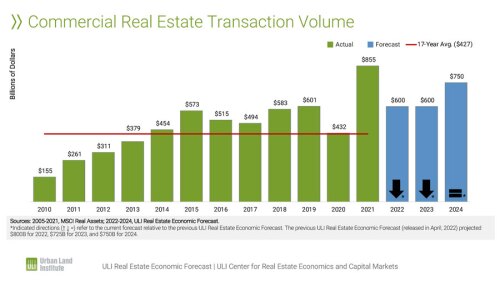Those attending the ULI Fall Meeting in San Francisco last week heard Condoleezza Rice, former U.S. secretary of state, deliver a resounding call for the United States to do nothing less than create a new world order.
“What we are seeing now is what happens when the world’s single greatest power gets tired,” said Rice, currently a professor of political economy at the Stanford Graduate School of Business. “This will get turned around or we will regret it, and the world will no longer be hospitable to free markets and free people.”
The reason the world feels so unstable and dangerous is a breakdown of the international order established by the United States and its allies in the wake of World War II. “In 1945, the U.S. accounted for half of the world’s GDP. We could have protected this, but we were haunted by the period between the wars that led to the Great Depression and probably World War II itself. So we founded institutions like the World Bank and IMF [International Monetary Fund] to create an international economy that would grow—one based on free markets and open trade.”
Another tenet of the postwar order was to support freedom and democracy, both at home and abroad, backed up by military power. The U.S. treaty with Japan and a newly created North Atlantic Treaty Organization (NATO) helped ensure that the defeated countries could grow and prosper and would not attack the victors again. American power seemed to peak with the demise of the Soviet Union and end of the Cold War. “But at that time,” said Rice, “we were just harvesting the good decisions made in the late 1940s, which led to the economic and political freeing of millions of people.”
All this changed on September 11, 2001, when the Secret Service literally carried her to a bunker for safety, Rice said. “This attack that originated in Afghanistan and probably cost about $300,000 led to what we have now—including ISIS, which is so brutal that even Al-Qaeda expelled them.”
That was just the beginning of the collapse of the 1945 world order. The 2008–2009 financial meltdown precipitated government crises throughout the world—in Brazil, India, Germany, Greece, China, and many other nations. China’s economic model based on low labor costs, the ability to make large-scale infrastructure investments, and state-owned manufacturing, has “run out of steam,” she said, and must convert to a consumer- and service-oriented economy that is incompatible with top-down control. In the Middle East, people are tired of the dynastic authority put into place by colonial powers following the collapse of the Ottoman Empire.
Added to that mix is the phenomenon of “great powers behaving badly”—such as China’s territorial claims, and the adventures of Russian leader Vladimir Putin. “Putin has turned eastern Ukraine into a failed state, and he is doing it again in Syria,” she stated. “He is trying to reestablish Russian power in the Middle East by keeping Syria’s Bashar Al-Assad in power, in coordination with Iran and Iraq. He knows what he is doing; he will press on until he is stopped.”
“These four crises mean that something has to happen to reestablish world power,” Rice said. “The international system doesn’t govern itself if no one defends it. When that happens, forces like Putin, Assad, and ISIS step forward.”
“In every crisis, there are opportunities,” she noted. “We cannot reestablish order without military power; defense budget cuts should be taken off the table. We need to demonstrate to Putin that the U.S. is still in the game. We need to deploy forces in the Baltic states, help arm Ukraine, and cooperate with the Turks to create a safe haven for Syrians and stem the tide of refugees.
“Putin is creating facts on the ground and gaining the upper hand; we need to create our own facts on the ground before it’s too late,” she added. “We should be able to defeat ISIS, which has just 40,000 fighters who march in columns while waving black flags.”
Demonstrating unwavering confidence in the ability of the U.S. to overcome challenges, Rice pointed out that “many opportunities come from the amazing innovation and creativity that we see all over the U.S. and in other countries. In the 20th century, greatness was determined by resources and industrial efficiency; today it is about mobilizing human potential. In the U.S., opportunities have not been limited by race or ethnology, so we have attracted talent from all over the world—people like Sergei Brin, who came from Russia with his parents at age four and went on to found Google. Immigration has been the lifeblood of our economy.”
The country’s ability to mobilize human potential is threatened, however, by a crisis in education, Rice argued. Upward mobility has given way to an opt-out education system, which allows the affluent to move to areas with good schools, leaving the poor in failing schools and dooming them to lives of unemployment. This failure is demonstrated by the 70 percent failure rate on the basic skills test required for military recruits.
To address the inequality of educational opportunities and to regain world leadership, the American public needs confidence and cohesion, suggested Rice. “We have gotten ourselves into a strange circumstance in which being an American is not our first line of identity,” she said. “We are a very diverse nation, but we are all Americans.”



